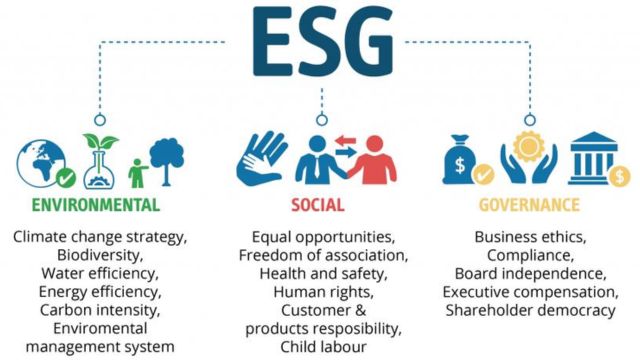Environmental, Social, and Governance (ESG) investing is a method of making decisions including non-financial elements. It ranks businesses according to their policies of environmental stewardship, social responsibility, and governance. This strategy seeks to produce long-term financial benefits while advancing favourable environmental and social results.
Environmental Factors: These assess a company’s impact on the planet, including its carbon footprint, resource usage, waste management, and efforts to combat climate change.
Social Factors: This dimension examines how a company manages relationships with employees, suppliers, customers, and the communities where it operates. It includes labor practices, diversity and inclusion, and community engagement.
Governance Factors: Governance involves the internal systems and controls a company uses to govern itself, make effective decisions, comply with the law, and meet the needs of external stakeholders. It includes board composition, executive compensation, and shareholder rights.
The concept of ESG investing gained prominence in 2004 with the United Nations’ “Who Cares Wins” report, which emphasized the importance of integrating ESG factors into capital markets for better societal outcomes.
Benefits of ESG Investing

1. Competitive Financial Returns
Contrary to the belief that ESG investing compromises returns, studies have shown that ESG-focused funds often perform on par with or better than traditional funds. For instance, ESG portfolios have demonstrated returns ranging from 2% to 10% annually above non-ESG benchmark portfolios. investing.io
2. Risk Mitigation
Companies with strong ESG practices are generally better at managing risks related to environmental disasters, social unrest, or governance scandals. This proactive approach can lead to more stable investments and reduced volatility.
3. Positive Societal Impact
Investing in ESG funds allows individuals to support companies that align with their values, promoting positive environmental and social outcomes. This alignment can lead to increased investor satisfaction and a sense of purpose.
4. Long-Term Sustainability
ESG investing encourages companies to adopt sustainable practices, ensuring long-term viability and profitability. By focusing on sustainability, companies can better navigate regulatory changes and shifting consumer preferences.
How to Start ESG Investing
1. Define Your Investment Goals
Determine what you aim to achieve with your investments, considering both financial returns and the impact you wish to make.
2. Research ESG Funds and Companies
Utilize ESG ratings provided by agencies like MSCI or S&P Global to assess companies’ ESG performance. These ratings can guide you in selecting funds or stocks that align with your values.
3. Choose the Right Investment Platform
Select a brokerage or investment platform that offers ESG investment options. Ensure the platform provides transparency regarding the ESG criteria used in fund selection.
4. Monitor and Adjust Your Portfolio
Regularly review your investments to ensure they continue to align with your ESG goals. Stay informed about changes in ESG ratings and company practices.Harvard Business School Online
ESG Investment Strategies
1. Positive Screening
This strategy involves actively selecting companies that perform well on ESG criteria. Investors focus on companies that are leaders in sustainability and ethical practices.
2. Negative Screening
Negative screening excludes companies or industries that do not meet certain ESG standards, such as tobacco, firearms, or fossil fuels. This approach helps investors avoid supporting practices they find objectionable.
3. ESG Integration
ESG integration incorporates ESG factors into traditional financial analysis. Investors assess how ESG issues impact a company’s financial performance and valuation.
4. Impact Investing
Impact investing aims to generate specific positive social or environmental effects alongside financial returns. Investors support projects or companies that address issues like renewable energy, education, or healthcare.
ESG Investment Options
For investors interested in ESG-focused funds, several options are available:
- iShares ESG Aware MSCI USA ETF (ESGU): This fund seeks to track the investment results of an index composed of U.S. companies with favorable ESG practices.
- Vanguard ESG U.S. Stock ETF (ESGV): This ETF offers exposure to U.S. companies that meet certain ESG criteria, excluding those involved in controversial activities.
- MSCI USA ESG Select ETF (SUSA): This fund focuses on U.S. companies with high ESG performance relative to their sector peers.
- iShares ESG MSCI KLD 400 ETF (DSI): This ETF tracks a capitalization-weighted index of 400 U.S. securities that have positive ESG characteristics.
ESG Certification and Registration
For individuals seeking to deepen their understanding of ESG investing, the CFA Institute offers the Sustainable Investing Certificate, previously known as the Certificate in ESG Investing. This program provides comprehensive training on integrating ESG factors into investment analysis.
To register for the certificate, visit the CFA Institute’s official website: CFA Institute Sustainable Investing Certificate
Upon registration, candidates gain access to online learning materials and the exam scheduling tool. The program allows six months to complete the exam from the date of registration.
Conclusion
ESG investing marks a change towards environmentally friendly and sensible investing methods. Investors can make wise selections that fit their principles and help to bring about good world change by including environmental, social, and governmental elements. Using certifications and resources at hand can help you improve knowledge and efficacy in ESG investment even more.
Discover the latest government and private finance programs designed to support your financial goals. Visit DigitalIndiaMIB.com for in-depth guides, application links, and expert insights.
How Does ESG Investing Impact Portfolio Risk?
ESG investing can potentially reduce portfolio risk by prioritizing companies with sustainable practices, minimizing exposure to regulatory, environmental, and social risks.
Are ESG Funds Suitable For Beginners?
Yes, ESG funds can be suitable for beginners, offering diversified investment options that align with ethical values while potentially delivering competitive financial returns.
How Can Investors Track ESG Performance?
Investors can track ESG performance through platforms like MSCI, S&P Global, and Bloomberg, which provide ESG ratings, scores, and comprehensive performance reports.
Can ESG Investing Include Cryptocurrency?
Yes, some ESG-focused funds include cryptocurrencies, especially those with sustainable mining practices or projects dedicated to reducing environmental impact.
What Are The Costs Associated With ESG Funds?
ESG funds may have higher fees due to extensive research, monitoring, and reporting processes, but they also offer potential long-term value and sustainable returns.













